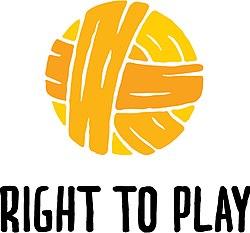 | |
| Founded | 2000 |
|---|---|
| Founder | Johann Olav Koss |
| Location |
|
| Origins | Olympic Aid |
Key people | Johann Olav Koss, Founder Kevin Frey, CEO Dennis Lepholtz, CFO |
| Website | www.righttoplay.com |
Right To Play is an international non-profit organization that empowers vulnerable children to overcome the effects of war, poverty, and disease around the world through play. Founded in 2000 by Johann Olav Koss, Right To Play works with schools and community-based organisations, training teachers and coaches in its innovative play-based learning methodology and holding play days and sports tournaments geared towards building children's life skills. Headquartered in Toronto, Canada, the organisation delivers programs in 15 countries across Africa, Asia, the Middle East, and has national offices in Canada, Germany, Norway, the Netherlands, Switzerland, the United Kingdom, and the United States.
History
Between 1994 and 2000, Right to Play, formerly Olympic Aid, continued to raise funds for children in disadvantaged situations, building on the momentum of subsequent Olympic Games. In 1996, Olympic Aid formed a partnership with UNICEF and raised $13 million USD prior to and during the Games in Atlanta.
With its incorporation in late 2000, Olympic Aid (which became Right To Play) made the transition from "fundraising vehicle" to implementing Non-Governmental Organization (NGO). In March 2001, the first sport and play programs began in refugee communities in Angola and Côte d'Ivoire.
During the 2002 Olympic Winter Games in Salt Lake City, Olympic Aid hosted a Roundtable Forum entitled "Healthier, Safer, Stronger: Using Sport for Development to build a brighter future for children worldwide".
Controversy
In October 2008, the International Olympic Committee (IOC) and the Vancouver Organizing Committee for the 2010 Olympic and Paralympic Winter Games (VANOC) announced that Right To Play would be banned from an official role at the 2010 Winter Olympics in Vancouver.[1] The two committees cited sponsorship conflicts as the reason behind the ban, identifying Right To Play sponsors such as Canon, Scotiabank, and Mitsubishi as competitors to Olympic sponsors Kodak, Royal Bank of Canada, and General Motors.[1] Right To Play had been present in an official role at every Summer and Winter Olympics since 2004, and since 1994 as Olympic Aid.[2]
See also
- Sports for Peace
References
- ^ a b The Canadian Press (October 3, 2008). "Charity booted from 2010 Olympic village over sponsorship conflicts". CBC News. Retrieved May 25, 2017.
- ^ The Canadian Press (January 22, 2009). "IOC says Right to Play not welcomed at Olympics". CTV News. Retrieved May 25, 2017.